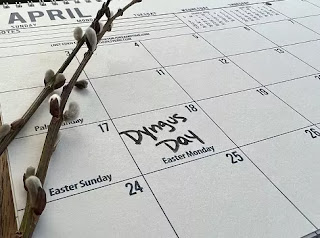When is Easter Monday this year?
On Easter Monday it is celebrated by Christians.
Previously it was known as Easter Week and not Easter Monday in many locations, and in the 19th century it was shortened to a one-day celebration and became Easter Monday.
This day is known as "Minimal Easter" in many European and South American countries. Which is known by a special name, which is the name "two angels" in the (Catholic) church.
 |
| Easter Monday |
What is Easter?
Easter (additionally called Pascha) is by and large accounted the main occasion of the Christian year, saw in March or April every year to commend the Resurrection of Jesus from the dead after his demise by execution (see Good Friday), which
Standard Easter date
Customary houses of worship like the Greek church, base their Easter date on the Julian schedule, while different Christians utilize the Gregorian schedule.
What is the significance of the name Easter?
Easter was named after Euster or Ostar, an agnostic goddess of fertility, which they experienced during the celebration of it, where they ate at the vernal equinox.
The words East and Estrogen, a female chemical, are both derived from her names. In Saxon culture the rabbit was sacred to Ostara, and the Easter bunny, his evolving tradition, is a far-reaching echo of that.
In any case, In many dialects other than English and German, the occasion's name is gotten from Pesach, the Hebrew name of Passover, a Jewish occasion to which the Christian Easter is personally connected, as the Gospel of John expresses that the last dinner occurred during a particular piece of the Passover customs.
In this way, Easter depends on Easter for much of its symbolic value as well as its position on the calendar.
The appointment
The dates of celebrating Easter vary from year to year. Why is this occasion different from another Christian occasion, for example, Christmas Day, which generally falls on December 25?
- The Gospels are ambiguous about the date of Easter, and this is the problem, as Matthew, Mark and Luke appear the same date. Also, John appears on a different date, and Easter commemorates the resurrection of Jesus, and this is another factor. Because the early Christians couldn't avoid Jesus' coming for a limited period of time, they didn't place a great deal of emphasis on dates.
- As time has passed, this lack of clarity about the date has led to the absence of a traditional date for Easter For example, if you traveled around Europe in the late third century, you could celebrate Easter a few times in approximately a month. Easter was always celebrated on April 25th in Alexandria, April 18th in Rome, and March 21st in Gaul. To be honest, the execution was carried out on a Thursday rather than a Friday in some parts of Celtic Britain.
- It was shortly after a few endeavors to set a standard date for Easter, that the equation of the Alexandrian Church was acknowledged as the right method for deciding the date. With this technique and a passing gesture to the strategy for working out Passover, Easter is the main Sunday after the primary full moon whose fourteenth day is on or after the Vernal Equinox. (see for the bookkeepers in the crowd underneath for the specific equation)
- The earliest date that Easter can be is March 22nd and the most recent is April 25th.
Hidden goodies (Easter Eggs)
Present day Easter festivals spin around eggs. They might be painted, moved down slopes or eaten in the event that they are of the chocolate assortment. The Christian tradition of an egg is a symbol of resurrection and revival, with the egg bringing new life into the world. It's additionally been said that egg reviews the state of the stone that moved away on Easter Sunday structure the burial place that held Jesus' body.
This egg custom is most likely a refined version of an older agnostic springtime custom. Around the vernal equinox, the ancient Persians welcomed their new year by adorning eggs.
Its reception into the Christian customs would have been very consistent, as eggs are restricted during the time of Lent going before Easter - as a matter of fact in numerous families the last eggs before Easter would have been utilized to make Pancakes on Pancake Tuesday.
In the event that you're searching for one more method for appreciating eggs during the Easter season, look at Bessieres, France, on Easter Monday, when local people concoct 15,000 eggs to make a goliath omelet.
Did you be aware?
Three realities about Easter Monday
- In America, after Halloween, Easter is the greatest treats consuming occasion of the year.
- The Egyptians, Persians, Gauls, Greeks, and Romans carried on the tradition of gifting eggs during this season, as the egg was a symbol of life for each of them.
- Easter's official bloom is the white lily. The white lily addresses effortlessness and immaculateness, which is the reason many temples and homes finish with the white lily for the occasion. In fact, they're commonly referred to as "Easter lilies."